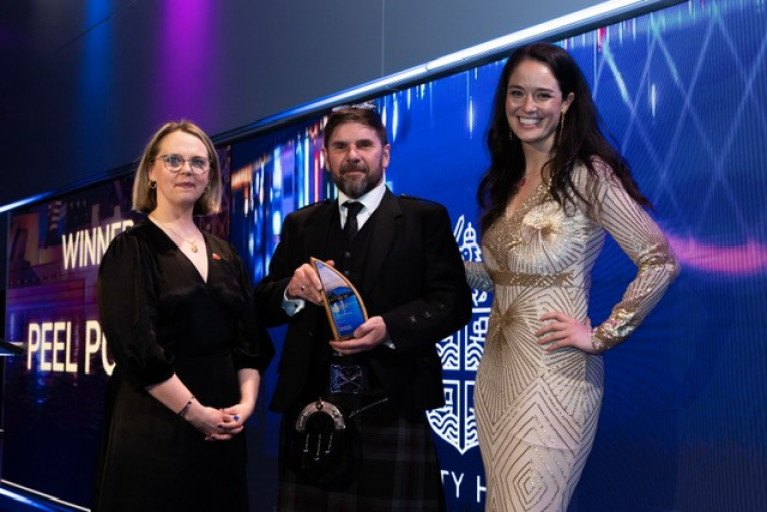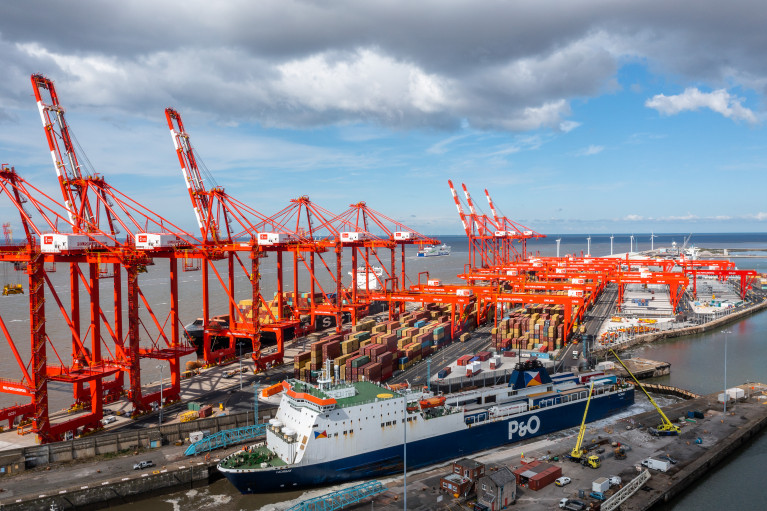Displaying items by tag: Net Zero: 2040
Prestigious Industry Award for Peel Ports Group Approach to UK Government’s Maritime 2050 Strategy
Peel Ports Group, one of the UK’s largest port operators, has won the Maritime UK award for seizing opportunities presented within the UK Government’s strategy for the sector - including its commitment to become a net zero port operator by 2040.
The leading port group emerged successful in the 2050 category after demonstrating its impressive focus on the core objectives of the Maritime strategy, which was created in partnership between the Government and industry.
The award, which was sponsored by the Department for Transport, acknowledges the steps the port operator has taken to deliver on the seven key strategic themes of the initiative, which are: Environment, Infrastructure, Technology, Security&Resilience, People, UK Competitive Advantage and Trade.
The win comes off the back of what was another game-changing year for Peel Ports, with the group demonstrating continued resilience in the face of the ongoing challenges posed by the pandemic and Brexit.
In 2021, the group announced its commitment to becoming net zero by 2040, ten years ahead of the Government’s national targets. It is the first major port group to make such an ambitious pledge.
In addition, last year, the port operator enabled the launch of several new services and trade opportunities, such as a freight-only ferry service connecting the Port of Sheerness and Calais with operator DFDS and the expansion of new multi-modal rail connections and crane capacity at the Port of Liverpool.
Major infrastructure investments over the last decade, to the tune of £1.2 billion, include the concept and launch of Liverpool2, a £400m deep water container terminal and the £100m development of a custom-built biomass import facility. It also includes the ongoing regeneration of Hunterston PARC, showcased by the government as one of the UK’s most exciting inward investment opportunities for the blue and green economy.
Speaking of the award, Mark Whitworth, CEO at Peel Ports said: “Being recognised for our efforts in the 2050 category is a fantastic, progressive achievement for our teams.
“We are proud to have worked tirelessly to support the key objectives of Maritime 2050, as well as facilitating continuous economic growth at a national and regional level.
“The recognition from our peers supports the resilience we have shown in the face of challenges posed by the pandemic, global port congestion and Brexit.
“Our teams continue to rise to every challenge and our success over the last 12 months has further positioned our ambitions for sustainable growth and the positive economic impact this has on the regions we operate within.”
The Maritime UK Awards ceremony took place on 10 March at the Glasgow Science Centre, with the awards presented by award-winning broadcaster Jennifer Reoch.
The event celebrates the work of the maritime sector, which is one of the UK’s biggest industries, adding £46.1bn to the economy every year and supporting 1.1 million jobs.
The Maritime UK Awards are open to all organisations from across the breadth of the maritime sector, including shipping, ports, services, engineering and leisure, and the award categories themselves are designed to reflect the themes of the Maritime 2050 strategy.
It is the third award Peel Ports Group has won in the last 12 months after being recognised as Greenfleet’s private sector commercial fleet of the year for its conversion to electric vehicles, as well as winning UK Ports Directory’s port operator of the year award.
Ports Group in UK Commits to Net Zero Emissions by 2040
The Peel Ports Group (see stake deal) has committed to becoming a net zero port operator by 2040, a decade ahead of the UK Government’s national decarbonising targets.
The UK's second largest port operator, headquartered in Liverpool, owns some of the UK’s largest and most important ports including the Port of Liverpool, Clydeport and London Medway, and is the first major port group to convey such ambitious plans towards tackling climate change.
The group has unveiled a number of initiatives and investments to help drive a more sustainable agenda and reach the net zero milestone by 2040 across all of its locations in the UK and Ireland (Dublin Port's MTL Terminals adds Afloat).
As part of COP26, Peel Ports Group is hosting two workshops at the International Maritime Hub, in collaboration with the British Ports Association, the UK Major Ports Group, Maritime UK and City of Glasgow College.
By the end of this year, Peel Ports aims to have 50% of its vehicle fleet replaced with electric cars, with the remainder in place by December 2022, and is currently undergoing trials of greener fuels and electric alternatives for the future of its operational machinery and equipment.
The port operator views investment as being the key to resiliency and has been passionate about developing a sustainable future for the supply chain for many years.
Peel Ports has invested over £1.2 billion across the last decade on sustainable infrastructure and technology to future proof its operations including the delivery of energy efficient cranes, LED lighting and choosing sustainable, low emission equipment and suppliers.
Mark Whitworth, CEO of Peel Ports said: Our ports provide critical infrastructure as the UK’s gateways for food, medical, energy and fuel supplies. It is therefore important that as a responsible business we incite positive change in the UK’s logistics market to tackle climate change
“We understand and acknowledge our responsibility to minimising the environmental impact of our operations for the benefit of the planet, while also ensuring the smooth continuation of the supply chain”
“Our vision for the future of our business, our people, our customers and our communities is ambitious. Ultimately, our net zero plans will work towards achieving long-term sustainable growth that has a positive impact on the environment, as well as regional and local economies for generations to come.”
The port operator is also promoting the benefits of ports closer to the end destination, in order to reduce emissions, as well as introducing major new rail services for better connectivity, taking tonnes of freight off the road.
It will also continue to support the changing energy markets with both offshore and onshore wind sites available across its various locations.
Furthermore, in order to future-proof its carbon neutral needs, the group has also created an Innovation Forum which seeks to answer some of the biggest questions around the reduction of emissions. The forum tracks down answers from universities, entrepreneurs and start-ups, which in turn pitch their ideas and solutions. The best of these can be deployed at scale with the necessary investment from the business.































































